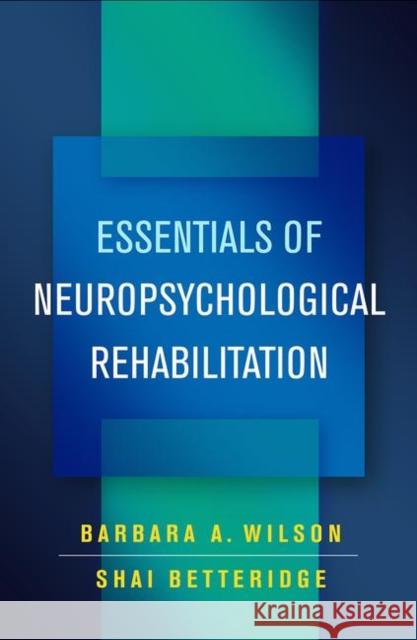Essentials of Neuropsychological Rehabilitation » książka



Essentials of Neuropsychological Rehabilitation
ISBN-13: 9781462540730 / Angielski / Miękka / 2019 / 236 str.
Essentials of Neuropsychological Rehabilitation
ISBN-13: 9781462540730 / Angielski / Miękka / 2019 / 236 str.
(netto: 167,88 VAT: 5%)
Najniższa cena z 30 dni: 166,18
ok. 22 dni roboczych.
Darmowa dostawa!
For people with disabilities caused by nonprogressive brain injury, challenges in everyday living can be multifaceted and overwhelming. This book presents key principles of holistic neuropsychological rehabilitation, helping practitioners stay on track through complex terrain.
Wydanie ilustrowane
"Wilson, a lodestar in the field, and Betteridge, an innovative practitioner, describe the essentials of neurological rehabilitation that is person centered, assessment and formulation based, goal minded, and grounded in the personally meaningful 'real world' of the patient. The book addresses key recovery factors, with a multimodal emphasis on the cognitive, emotional, behavioral, practical, interpersonal, and psychosocial ramifications of acquired brain injuries. Tried-and-true fundamentals are nicely interwoven with cutting-edge therapies and technological advances. The case studies and vignettes add to the applicability of the principles."--Pamela S. Klonoff, PhD, ABPP-CN, Clinical Director and neuropsychologist, Center for Transitional Neuro-Rehabilitation, Barrow Neurological Institute and Dignity Health, Phoenix, Arizona
"This concise yet thorough volume is written in clear, accessible prose. The book includes both theoretical and practical material, with numerous case examples and sample data collection forms that help to bring the content home. The keys to successful neurorehabilitation are all here--close partnerships with patients and their families and communities, an attitude of optimism balanced by realism, and a steadfast focus on meaningful goals. The chapter on technology alerts the reader to developing trends. The voices of people directly affected by brain injury are included throughout the book to remind practitioners why we are doing this challenging and important work."--Tessa Hart, PhD, Scientist Emerita, Moss Rehabilitation Research Institute, Elkins Park, Pennsylvania
"Clinicians and researchers who want to know about holistic neuropsychological rehabilitation, this is the book for you! Wilson and Betteridge distill their knowledge gained over decades of clinical and research experience. The book explains the concepts and models underpinning neuropsychological rehabilitation, offers practical advice on assessment and goal setting, describes new intervention approaches, and provides case illustrations and visual aids. The authors have produced a valuable, highly accessible 'how-to' resource."--Robyn Tate, PhD, Professor Emerita, John Walsh Centre for Rehabilitation Research, University of Sydney, Australia
"This book offers an impressive, passionate vision of how to improve clinical neuropsychological services to maximize the well-being of patients and their families. While acknowledging the challenges of real-world clinical practice, the authors are optimistic about ways to engage patients and tackle functional goals. Readers seeking to make evidence-based clinical decisions will appreciate the breadth and depth of the information presented. Clinical cases bring to life the principles described in each chapter. In the graduate classroom, the cases will serve as a strong foundation for practical discussions."--Anastasia M. Raymer, PhD, CCC-SLP, Department of Communication Disorders and Special Education, Old Dominion University-
1. What Is Neuropsychological Rehabilitation?
2. Who Can Benefit from Neuropsychological Rehabilitation?
3. The Purposes and Process of Neuropsychological Rehabilitation
4. The Broad Theoretical Base of Neuropsychological Rehabilitation
5. Appropriate Assessment and Formulation for Neuropsychological Rehabilitation
6. The Need for a Working Partnership in Neuropsychological Rehabilitation
7. Holistic Goal Setting in Neuropsychological Rehabilitation
8. Using Goals to Guide Neuropsychological Rehabilitation
9. The Interconnectedness of Cognition, Emotion, and Behavior: The Basis of the Holistic Approach
10. The Uses of Technology in Neuropsychological Rehabilitation to Improve Daily Functioning and Quality of Life
11. Six Fundamental Components of Neuropsychological Rehabilitation
12. Summary and Conclusions
References
Index
Shai Betteridge, PsychD, CPsychol, PGDip, is Head of the Clinical Neuropsychology and Clinical Health Psychology Department at St. George's Hospital in London, United Kingdom. She is a chartered clinical psychologist with the British Psychological Society, a member of its Division of Neuropsychology’s Specialist Register of Clinical Neuropsychologists, and a registered practitioner psychologist with the U.K. Health and Care Professions Council. Dr. Betteridge has worked in various research and applied areas related to neuropsychology and neuropsychological rehabilitation. She has a keen interest in national government agendas that have an impact on the field of neuropsychological rehabilitation and participates in several working groups committed to quality improvement and excellence. She is a specialist inspector for neuropsychology services for the Care Quality Commission, the independent regulator of health and social care in England; provides core teaching modules in neuropsychology for clinical psychology training courses; and is an oral examiner for the U.K. Qualification in Clinical Neuropsychology.
1997-2026 DolnySlask.com Agencja Internetowa
KrainaKsiazek.PL - Księgarnia Internetowa









